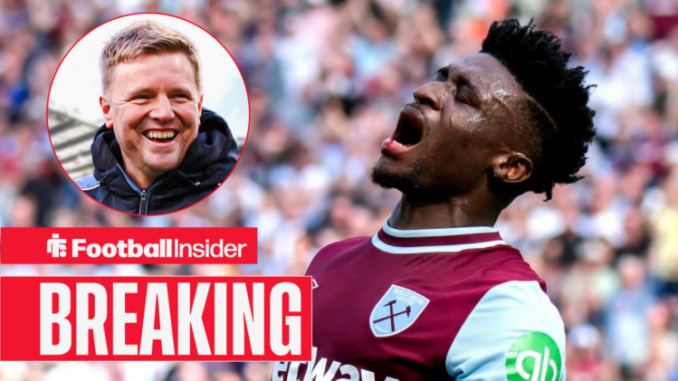
Newcastle’s Mohammed Kudus Transfer Plan Revealed – And Why It Was Abruptly Aborte
June 1, 2025 – By Sports Correspondent, The Chronicle
In a dramatic turn of events that underscores the complexity of modern football transfers, Newcastle United’s ambitious plan to sign Ghanaian star Mohammed Kudus from West Ham United has been revealed — only to be ultimately aborted at the eleventh hour due to a confluence of financial, strategic, and personal factors.
The Transfer Vision
Newcastle United, under the ownership of the Saudi Public Investment Fund (PIF), had identified Kudus as a key summer target as part of manager Eddie Howe’s strategy to bolster attacking creativity and versatility ahead of the 2025/26 campaign. Sources close to St. James’ Park confirm that internal scouting reports rated Kudus highly, viewing him as a perfect fit for the club’s evolving 4-2-3-1 system.
Kudus, who had a standout season with West Ham despite their mid-table finish, scored 14 goals and contributed 6 assists across all competitions. His dribbling prowess, ability to operate both as a right winger and an attacking midfielder, and his Premier League experience made him one of the most coveted names on the summer market.
Newcastle saw him as a dynamic upgrade to their attacking midfield options, with the potential to share creative responsibility with Bruno Guimarães and reduce the dependency on Anthony Gordon and Alexander Isak for goal contributions.
The Negotiation Phase
Negotiations between the clubs began in early May, with Newcastle reportedly willing to offer a fee in the region of £60 million — slightly above Kudus’ buyout clause — to fend off competition from European giants like Bayern Munich and Juventus. West Ham, aware of growing interest, appeared open to the deal, especially with new manager Julen Lopetegui interested in reshaping the squad.
Discussions progressed rapidly, with Kudus’ representatives believed to have held preliminary talks with Newcastle officials. Personal terms were not expected to be a major stumbling block, as the player had expressed openness to a move that could involve European football and a starring role.
However, complications began to arise behind the scenes.
The Collapse – What Went Wrong?
Despite weeks of optimism, the Kudus-to-Newcastle deal dramatically collapsed just days before Newcastle were expected to table a formal offer. According to multiple sources, three main issues derailed the transfer:
1. Financial Fair Play (FFP) Concerns
Newcastle’s spending over recent windows had drawn increased scrutiny from the Premier League, and club executives were reportedly warned that a high-cost signing like Kudus could edge them perilously close to breaching FFP regulations. While the Magpies had planned to offload fringe players to create space on the wage bill, those sales had not materialized as quickly as hoped. As a result, the club decided it was too risky to proceed with a large outlay without guaranteed exits.
2. West Ham’s Last-Minute Change of Heart
Though initially receptive, West Ham’s board began to reconsider the timing of a Kudus sale, especially as they struggled to attract replacements of comparable quality. Kudus, only one year into his Hammers tenure after joining from Ajax for £38 million, had quickly become a fan favorite and one of the club’s few consistent performers. Letting him go this summer risked sending the wrong message as Lopetegui tried to build momentum.
3. Player’s Hesitation Over Project
While Kudus was intrigued by the opportunity, it is understood that he harbored concerns about Newcastle’s European ambitions after the club narrowly missed out on UEFA competition following a 7th-place finish. In contrast, interest from clubs playing in the Champions League made him pause. Additionally, Kudus reportedly wanted assurances about his position and playing time in Eddie Howe’s plans — guarantees Newcastle were reluctant to formalize this early in the summer.
Reaction and Fallout
The aborted deal has caused ripples through both fanbases. Newcastle supporters, hopeful of a marquee signing to ignite a new era, voiced frustration on social media over what some see as poor transfer planning. Meanwhile, West Ham fans celebrated the news, hailing Kudus as a foundational piece in their rebuild.
Football pundits have reacted with mixed views. Former Newcastle midfielder Jermaine Jenas told BBC Sport:
> “It’s a big disappointment for Newcastle. Kudus is the type of player who can unlock defences, and that’s exactly what they lacked in key games last season. But I also respect the club for pulling the plug if they felt the deal wasn’t right financially. That shows maturity.”
Transfer expert Fabrizio Romano also weighed in on X (formerly Twitter):
> “Newcastle had everything lined up for Kudus, but FFP complications + player uncertainty changed the picture. Now back to square one for their summer strategy.”
What’s Next for Newcastle and Kudus?
With the Kudus pursuit now shelved, Newcastle are reportedly turning their attention to more financially feasible options, including Bayer Leverkusen’s Florian Wirtz (though he may prove equally expensive), and Lazio’s Mattia Zaccagni. Internal discussions have also resumed around promoting more youth talent into the first team as a workaround for their FFP limitations.
As for Kudus, he is likely to stay at West Ham for at least another season unless a compelling offer arrives. With his stock continuing to rise, the Hammers will need to offer him a clear sporting vision to fend off suitors come January or next summer.
Conclusion
In a transfer saga filled with promise and potential, Newcastle United’s attempt to bring Mohammed Kudus to Tyneside stands as a reminder that football deals are rarely about just money or talent. Timing, trust, and long-term vision are equally critical. For now, both club and player continue on their separate paths — their futures still very much in motion.
Leave a Reply